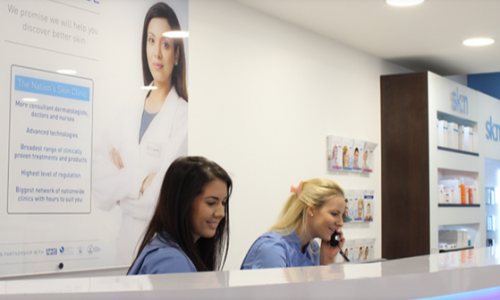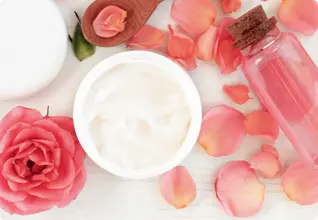Could Alcohol Be Causing Your Rosacea?

Medically Reviewed June 2023, by Daron Seukeran, Group Medical Director, for sk:n. Next review due June 2024.
Rosacea is an incurable, long-term, chronic skin condition that causes facial redness across the cheeks, nose, chin, and forehead. Rosacea is a common condition, primarily affecting women and those with lighter skin, but the symptoms can often be worse when found in men.
Alongside redness, a rosacea rash can cause thread veins, thickening of the skin and excess, bumpy tissue, especially around the nose, as well as papules, pustules and spots.
If you have rosacea, you may have noticed certain activities, drinks, foods, temperatures, or emotions will cause your rosacea to flare up; these are some of the rosacea triggers. If you’re unsure what your triggers are, keeping a journal or digital diary to determine what may be causing flare-ups will help you learn more about them.
It’s important to get your rosacea under control as rosacea can become more challenging to treat over time; some patients have found treatments that have worked earlier lose efficacy as time goes on.
A survey by the National Rosacea Society found that certain alcoholic beverages could be affecting rosacea more than others. Although it’s important to note, the common myth that heavy drinking or alcohol causes rosacea is untrue; this survey helps to dispel the myth.
Alcohol is a widespread trigger for rosacea, and understanding how it can affect your rosacea is essential in keeping your condition under control. Of the respondents who were affected by alcohol, these are the percentages of participants who found these drinks cause outbreaks.
- Red wine, 76%
- White wine, 56%
- Beer, 41%
- Champagne, 33%
- Vodka, 33%
- Tequila, 28%
- Bourbon, gin, and rum, 24%
- Scotch, 21%
Around two-thirds of those affected by alcohol found that it only took a single drink to cause a rosacea reaction. Read on to learn if alcohol is causing your rosacea reaction and how you can deal with it.
Is Alcohol Causing My Rosacea Outbreak?
To find out if alcohol and the kinds of alcohol that triggers your rosacea, keeping a diary will be helpful. If you’ve never tracked your triggers before, think back and consider your previous flare-ups and what caused these.
As seen in the study by The Rosacea Society, red and white wine are the most likely to cause a rosacea flare-up. Once you know what could be causing your rosacea flares, it’s important to gather the ‘evidence”; this will be the rosacea diary you complete every time you have a flare-up.
Keep note of what you’ve drunk, the amount you’ve drunk, and the intensity of your rosacea symptoms. This will also help you discover your tolerance levels. For example, if you drink a glass of wine and experience no reaction, but two glasses cause a big flush, then you’ll know how much you can safely consume.
Can I Still Drink Alcohol With Rosacea?
This question will largely depend on how your body reacts to different alcohols and ingredients. You may be able to reduce your flare-ups by limiting the amount you drink and drinking a glass of cold water after every drink or by avoiding certain types of alcohol and focusing on others.
This will also be a personal decision for you; if you notice your face is flushed redder than normal after a few drinks, but it goes away in half an hour, ask yourself if you enjoy the glass enough to have temporary flushing of your face.
Treating Rosacea
Rosacea isn’t curable, but you can control the symptoms through treatments. Therefore, it’s important to decipher what symptoms of rosacea you have to choose your treatment effectively. You can read our blog dedicated to the different types of rosacea and their corresponding treatments to learn more.
The best rosacea treatment will depend on your particular variations of symptoms. We offer the following methods of rosacea treatment:
- Laser Treatment
For patients with visible blood vessels, laser treatment can be used to shrink them. This treatment uses brief pulses of light energy that target only the blood vessel, leaving the surrounding skin unharmed.
- Skin Peels
Skin peels help rosacea by exfoliating the top layers of skin, speeding up skin renewal and cell turnover, whilst preventing pores from becoming clogged with dead skin cells, which can aggravate rosacea. They can also help to reduce inflammation and promote skin healing.
- Medication
There is a range of oral and topical medications available, and these are capable of treating the redness, pimples, and bumps associated with rosacea. Such treatments can be prescribed by one of our dermatologists to help you gain immediate control over the condition. Usually, subsequent long-term use of topical therapy is advised to maintain remission.
- Skincare Products
A gentle skincare routine can be invaluable in helping to control rosacea. In general, non-irritating skincare products are advisable, and protection from sun exposure by using a solid sunscreen also helps. In addition, your practitioner can create a product pack unique to your concerns.
Key Takeaways
- Though rosacea is an incurable, long-term condition, it can be significantly managed.
- Noticing your triggers and avoiding their causes will help you to prevent any further flare-ups successfully.
- Alcohol is a widespread trigger for rosacea, though it can affect certain people more than others.
- Identifying the kinds of or amounts of alcohol that trigger your rosacea can help you choose the right treatment.
- Keeping a diary of your triggers will help you to avoid them in the future.
- Choosing the right treatment for rosacea will help you manage your symptoms effectively.
Related Articles

08
Apr 2024

08
Apr 2024
Request a callback
One of our friendly sk:n advisors will call you to book your consultation.
- More than 450 consultants, doctors, nurses and medical practitioners
- Regulated by the Care Quality Commission, Health Inspectorate Wales and Health Improvement Scotland
- Partner of the NHS
- Rated excellent by our clients on Trustpilot
- Strict safety and care protocols




